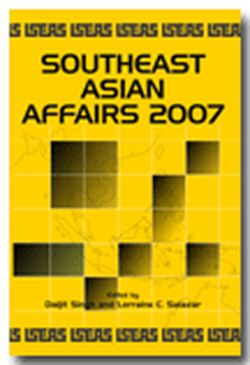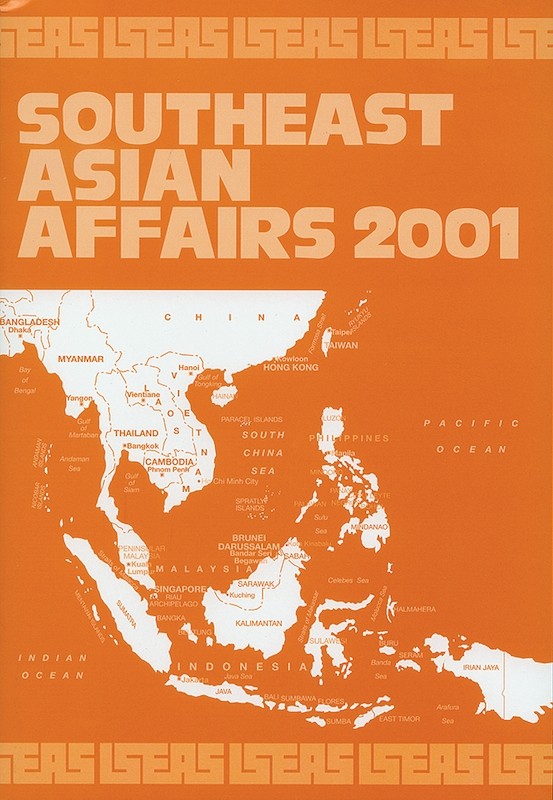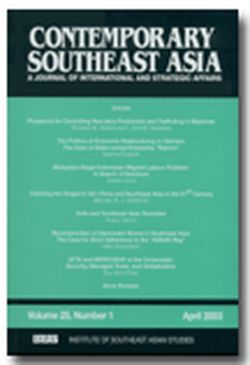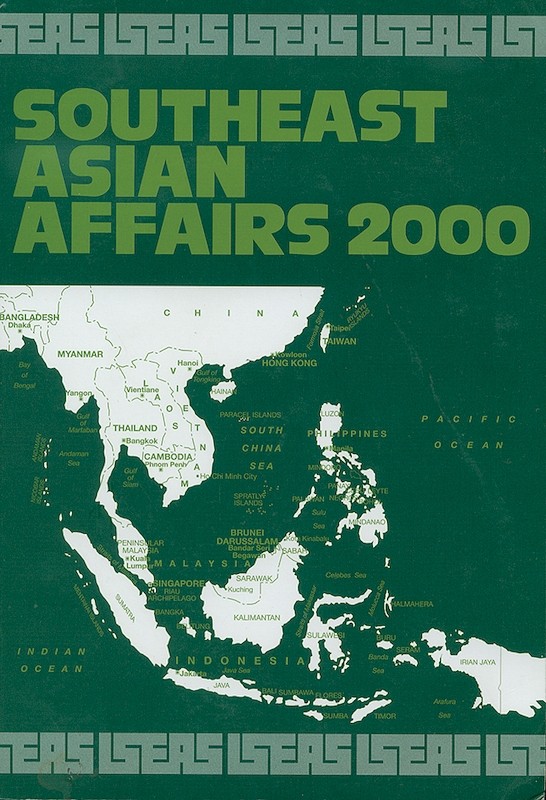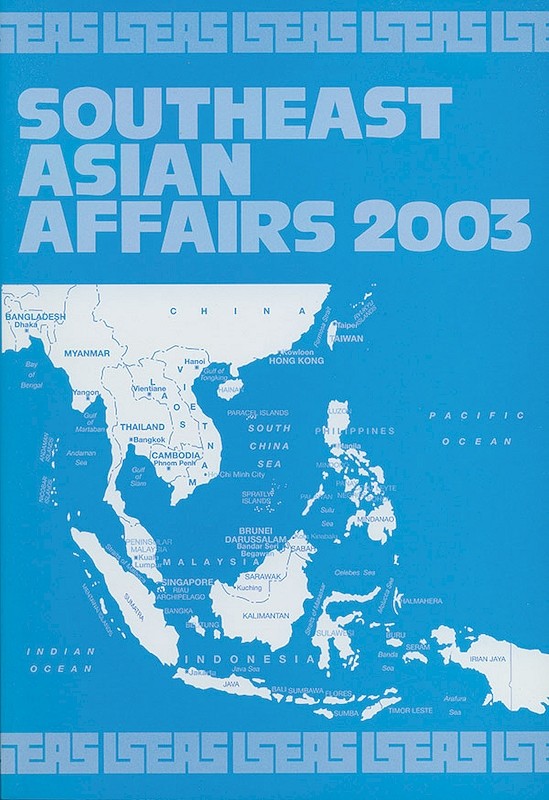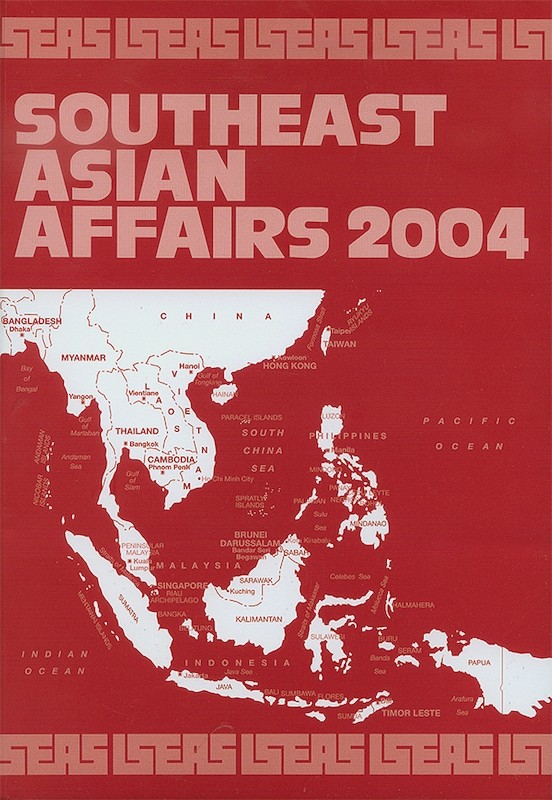Southeast Asian Affairs 2002
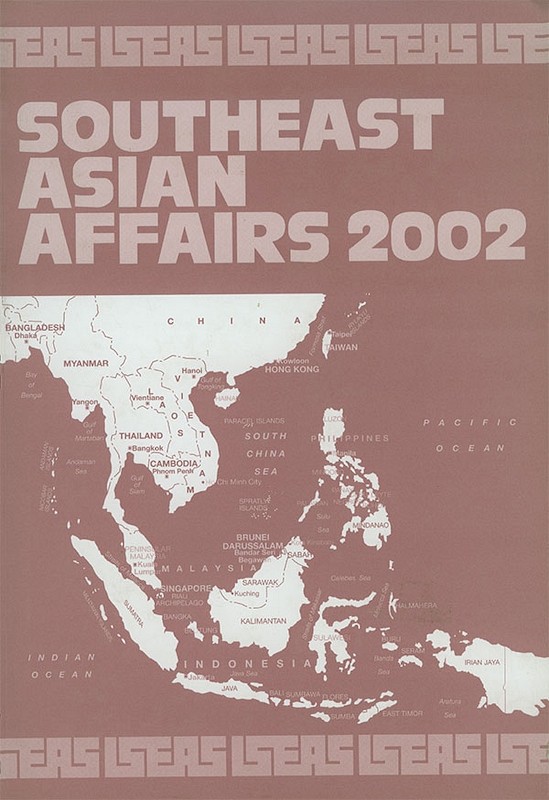
Date of publication:
2002
Number of pages:
377
Code:
SEAA2
Reviews
"In 2001, the economic slowdown in the United States resulted in lower growth rates in the ASEAN-5 countries. Foreign Direct Investments in Southeast Asia remained well below 1997 levels because of the perceptions of instability in the region and the attractions of China. The terrorist attacks in the United States on 11 September and their aftermath led to new security concerns all over the world... The book is an annual review of significant developments and trends in the region" (Finance India).
About the publication
Southeast Asian Affairs, of which there are now twenty-nine in the series, is an annual review of significant developments and trends in the region. Though the emphasis is on ASEAN countries, developments in the broader Asia-Pacific region are not ignored. Readable and easily understood analyses are offered of major political, economic, social, and strategic developments within Southeast Asia.
The contributions can be divided into two broad categories. There are those which provide an analysis of major developments during 2001 in individual Southeast Asian countries and in the region generally. Then there are the theme articles of a more specialized nature which deal with topical problems of concern.
This volume contains twenty articles, dealing with such major themes as international conflict and co-operation, political stability, and economic growth and development.
The contributions can be divided into two broad categories. There are those which provide an analysis of major developments during 2001 in individual Southeast Asian countries and in the region generally. Then there are the theme articles of a more specialized nature which deal with topical problems of concern.
This volume contains twenty articles, dealing with such major themes as international conflict and co-operation, political stability, and economic growth and development.
Contents
-
Preliminary pages
[Whole Publication] - THE REGION
-
1. Southeast Asia in 2001: A Paradigm in Transition?, by Kusuma Snitwongse, author see abstractThe political transition in some of the original members of ASEAN were made more difficult to manage by the economic downturn and existing political inequity along ethno-religious lines, particularly in Indonesia and the Philippines. The terrorist attacks on the United States on 11 September and their aftermath served largely to highlight the existing problems in Southeast Asia rather than create new ones. Although links with the Al-Qaeda were uncovered, the impact of 11 September was more to engender greater recognition of the transnational nature of terrorism as well as of other non-traditional security issues. However, 11 September has brought about changes in great power relations in the region, though how enduring they will be is still unclear.
-
2. ASEAN: Economic and Financial Developments in 2001, by Denis Hew Wei-Yen, author see abstractIn 2001, the global economic downturn and the 11 September terrorist attacks on the United States have made ASEAN economies vulnerable to an external environment that has become unfavourable and highly uncertain. Although, the ASEAN-5 enjoyed strong economic recoveries in 1999 and 2000, driven by bouyant global demand for their exports, growth decelerated significantly in 2001. Furthermore, bank and corporate restructuring have become more difficult in this environment. There are also growing concerns that Islamic militancy and its reverberations across Southeast Asia may discourage foreign investments in the region. ASEAN policy-makers will need to re-think their hitherto successful economic development model and factor in a rising China.
-
3. APEC: Success, Weaknesses, and Future Prospects, by John McKay, author see abstractThe Asia-Pacific Economic Co-operation (APEC) not only survives; it has shown itself to be quite adaptive and flexible. It can still play a very useful role in regional affairs. However, the organization has a number of weaknesses and faces some daunting challenges. The author reviews APECs twelve-year history, details the emergence of its programmes, and finally, looks at some key problems facing the organization, as well as speculating on some possible future directions.
-
4. Timor Leste, Timor Timur, East Timor, Timor Lorosa'e: What's in a Name?, by Anthony L Smith, author see abstractThis article summarizes some of the key issues for East Timor during 2001, and beyond. While East Timor is set to be fully independent by May 2002, considerable progress has been made by the U.N. and the East Timorese authorities, in restoring governance following the devastating events of 1999. Although the United Nations role has not been without controversy, it has been, on balance, necessary to the territorys reconstruction. One of the key events of 2001 was the election in August, which gave Fretilin a working majority in the constituent assembly. A myriad of problems confront East Timor development issues, negotiating over the Timor Gap resources, the wind down of the U.N. operation during 2002, refugees, reconciling with the past, establishing East Timors place in the world, and so on. With the planned withdrawal of U.N. peacekeeping troops, and a handover to East Timors own defence forces, lingering concerns remain about a latent threat from Timorese militia elements just over the border.
- BRUNEI DARUSSALAM
-
5. Negara Brunei Darussalam: Light at the End of the Tunnel, by Mohamad Yusop bin Awang Damit, author see abstractIn Brunei Darussalam, the gloomy prospects for the non-oil sector of the economy brightened somewhat towards the end of the year as stimulative measures were announced. Efforts to diversify the economy continued. Unemployment among youth, including degree and Higher National Diploma holders, was a serious problem. A new press law was introduced. Among other things, it requires all local newspapers to obtain an annual permit and to pay a deposit. In another development, religious schools were integrated with normal schools under the Ministry of Education.
- CAMBODIA
-
6. Cambodia: Transnational Pressures and Local Agendas, by John A Marston, author see abstractCrucial to understanding contemporary Cambodia is the way transnational forces interface with local agendas. The author analyses this interface between a variety of external pressures and the realities of domestic political patronage and "strongman politics". Areas covered in this context include the commune elections, the tribunal to try Khmer Rouge leaders, and the activities of the Cambodian Freedom Fighters based in California. Also dealt with briefly are Cambodias international relations and economy during 2001.
- INDONESIA
-
7. Indonesia: The Year of Continuing Turbulence, by Irman G Lanti, author see abstract2001 is a year of continuing turbulence in Indonesia. The first half of the year saw a great deal of energy being expended on political infighting between President Abdurrahman Wahid and his rivals, which ended in his impeachment in July. While the rest of the year was marked by relative stability in Megawatis coalition government, other problems continued to persist. The government has been criticized for its slowness to respond to problems and for showing the tendency to return to centralistic autocracy. The economy remained in a bad condition as the government failed to carry out scheduled reforms, the state budget was in deficit, and the rate of inflation soaring. Even though the issue of secessionism was relatively muted compared with previous years, fighting continued in Aceh and Papua, where the murder of the Papuan independence leader has brought more complications. The inter-ethnic conflicts also continued to flare up in several regions, but the year was closed on a positive note as the government was able to broker a peace deal in Poso, which could serve as a model for future peacemaking initiatives. The 11 September incident, and subsequent US-led war against terrorism, brought another problem for Megawatis administration. Initially supporting the U.S. initiative, it appeared to backtrack later on, probably due to domestic pressure, as many radical Muslim groups conducted a number of anti-U.S. protests.
-
8. The Indonesian Labour Movement: Resurgent or Constrained?, by Vedi R Hadiz, author see abstractThe fall of Soeharto provided a limited window of opportunity for Indonesian workers. The unravelling of the New Order's institutional structures of control has meant that there is greater freedom of organization and association for workers, and that overt military intervention into labour affairs is less possible than in the past. Thus, we have witnessed the establishment of dozens of new labour organizations in the last three years. However, workers are constrained by the fragmented nature of the labour movement a legacy of thirty years of authoritarian rule massive unemployment after the economic crisis, as well the absence of viable opportunities for cross-class alliances. Reformasi is currently being presided over by interests that have little concern with labour issues, except to perhaps selectively mobilize workers in the context of inter-elite struggles. Unable to fully exploit what opportunities have been presented by the more open political context, the labour movement, though active, remains largely ineffective.
- LAOS
-
9. Laos: Sedately Seguing into the Twenty-first Century, by Nick J Freeman, author see abstractAfter a relatively torrid couple of years, 2001 was more sedate for Laos. The signs of political unrest and sporadic acts of terrorism that the country witnessed throughout 2000 appeared to fully abate in early 2001. Spiralling inflation was brought under control, as was the foreign exchange rate for the Lao currency. The Seventh Congress of the Lao Peoples Revolutionary Party (LPRP), held in March 2001, saw some changes to the senior leadership, but government policy did not alter in any significant way. A new, and relatively ambitious, five-year economic development plan was unveiled by the government. The resumption of IMF lending in 2001 was a welcome development, although a general frustration persists amongst foreign donors that the economic reform process in Laos is too slow and unfocused. Vientiane also faced increased criticism from the United States and Europe in 2001 over its human rights record.
- MALAYSIA
-
10. Malaysia: 11 September and the Politics of Incumbency, by K S Nathan, author see abstractIn the past, the Mahathir administration has faced twin challenges to its legitimacy: (1) the arrest and trial of former Deputy Prime Minister Anwar Ibrahim; and (2) allegations of corruption and collusion. However it became evident in 2001 that UMNO has recaptured much of the Malay vote. This is partly to do with the failure of the opposition to cohere in an electoral pact. The events of 11 September also strengthened the Mahathir administration, domestically and internationally. When the main opposition party, PAS, declared a jihad on the United States, many Malaysians were put off by this extremism, and by contrast Dr Mahathir could claim the moderate middle ground. Thus, the ruling Barisan Nasional has strengthened its fortunes.
-
11. Malay Dominance and Opposition Politics in Malaysia, by Lee Hock Guan, author see abstractThe performance of the Barisan Alternatif (BA, the opposition coalition) in the 1999 election gave hope that Malaysian politics might finally move beyond the Barisan Nasionals brand of ethnic politicking. An emerging interpretation equated the large Malay vote for the BA as a move away from the ethnic-based issues to that of the reformasis universal ones. However, given that the BA was composed of political parties with varying agendas and interests, although the parties managed to cobble together a common manifesto, there was an inherent tension in the manifesto as it includes both ethnic and universal goals. This article will show that the BA did not succeed in breaking away from the UMNO-defined ethnic parameters, ketuanan Melayu (Malay dominance), ethnic quotas, and Islam, which have prevailed in political and social discourse in Malaysian society. It is this failure to go beyond these defined parameters, in particular with regard to the issue of Islam in public life, that contributed to the departure of the Democratic Action Party from the coalition and thus the fracturing of the BA.
- MYANMAR
-
12. Myanmar: Secret Talks and Political Paralysis, by Donald M. Seekins, author see abstractAt the close of 2001, the much-anticipated "breakthrough" in the secret talks between Aung San Suu Kyi and the ruling junta had not occurred. Sceptical observers believe that the military government agreed to the talks only as a short-term measure to gain foreign financial support in the face of overseas sanctions and a deepening economic crisis. A major obstacle to reconciliation is the rivalry among the two top military leaders, the relatively pragmatic and outward-looking Lt-Gen. Khin Nyunt and the hardline General Maung Aye. "Collegial dictatorship", which replaced Ne Wins personal dictatorship from 1988, has led to paralysis in many areas, especially economic policy.
- PHILIPPINES
-
13. The Philippines: Gloria in Excelsis, by Paul A. Rodell, author see abstractThe year 2001 was an eventful one. It saw the removal of President Estrada through another "People Power" uprising; the near overthrow of his successor by his enraged supporters; the Senate elections; the international spotlight on the Abu Sayyaf group after 11 September because of its links with the Al-Qaeda; increased U.S. military involvement in the fight against the Abu Sayyaf; and the unsuccessful revolt of Nur Misuari, the governor of the Autonomous Region of Muslim Mindanao, his dramatic flight to Malaysia and subsequent arrest and repatriation to the Philippines. Through all these developments President Gloria Macapagal-Arroyo displayed stability, political skill and maturity, and had strengthened her position by the end of the year.
-
14. The Philippine Development Puzzle, by Arsenio Molina Balisacan, Hal Hill, authors see abstractThe Philippines is one of the worlds major development puzzles. In the immediate aftermath of the Pacific War, and despite extensive wartime destruction, it had one of the highest per capita incomes in East Asia. Its initial conditions were comparatively favourable. Even as late as 1980, the country was still regarded by most analysts as belonging to the second generation of the Asian tiger economies. Yet its development outcomes have been disappointing. In 2000, its real per capita GDP was about the same as that of 1980. Its per capita income was overtaken by Korea and Taiwan in the 1950s, Thailand in the 1970s, Indonesia in the 1980s, and China in the 1990s. It missed out almost completely on the Asian boom from the late 1970s until the mid-1990s. Its East Asian "outlier" status was also evident during the recent Asian economic crisis, which it survived better than most of its major neighbours. Against this backdrop, this article provides a brief overview of the development record since around 1980, drawing attention also to the significant reforms enacted from the late 1980s onwards. It also addresses the larger question of why the Philippines has underperformed relative to its obvious potential.
- SINGAPORE
-
15. Singapore: A Home, a Nation?, by Gillian Koh, Ooi Giok Ling, authors see abstractIf ever there were a year when the legitimacy of the Peoples Action Party (PAP) regime in Singapore might have been tested, 2001 would have been it. It faced tensions in its relationship with the domestic Malay/Muslim community, exacerbated by the 11 September terror attacks on the United States. It had to address the problems of an economy in severe recession, the result of both cyclical conditions of the global economy and internal structural limitations. It also had to respond to the need for succession and renewal in political leadership. This article reviews how, in a year when the regimes key pillars of governance like multiracialism, meritocracy, and economic growth were tested, it addressed the challenges and prepared the political ground to secure a thumping victory at the electoral box, and at least ostensibly, a strengthened mandate to "remake Singapore" over its next term in office.
-
16. Rethinking Singapore Inc. and GLCs, by Linda Low, author see abstractSingapore's development state has proven its worth in the old economy where state-led industrialization spawned Singapore Inc. and its government-linked companies (GLCs). But as Singapore recharts its growth and development strategy towards a knowledge-based economy (KBE) that requires creativity and innovation, Singapore Inc. and GLCs cannot remain as they have been. The author examines the salient features of Singapore Inc. and GLCs, the imperatives behind a rethink leading to their restructuring or reinvention and the political economy implications of these changes.
- THAILAND
-
17. Thailand: Thaksin Fever, by John Funston, author see abstractPrime Minister Thaksin Shinawatra formally took power in February 2001 amid euphoric hopes that he would provide quick solutions to Thailands problems. That mood persisted throughout the first half of the year, with his impeachment by the National Counter Corruption Commission for false declaration of assets actually increasing sympathy for him. But after judges voted 8-7 against conviction, public support has gradually declined. By December, opinion polls showed his popularity at around 48 per cent, still respectable but well down on 72 per cent earlier in the year. Several factors contributed to this turnaround. The economy has slowed to around 1.5 per cent, rather than speeding up as promised. And there is widespread concern over a retreat from political reform including dependence on traditional politicians and the military, hostility towards the media, lukewarm support for independent institutions such as the National Counter Corruption Commission, meddling in the bureaucracy, and plans to review democratic guarantees in the Constitution.
-
18. Thailand's Non-Recovery, by Peter Warr, author see abstractIn December 2001, King Bhumipol of Thailand observed that economic and social conditions were getting worse. Economic evidence supports this view. This article shows that Thailand continues to suffer in the aftermath of the 1997 currency crisis. Banks are experiencing a "liquidity trap", public debt remains too high, export demand is low, and the general business climate is experiencing a complete lack of confidence. Although the most urgent need is to alleviate poverty, most of all through the much needed reform of (and extension of) education, there are growing fears that the Thaksin government may give priority instead to pork-barrel deals to political allies. The political capital held by the Thaksin government give it the opportunity to direct resources to where they are needed. It remains an open question as to whether this opportunity which may not occur again is seized.
- VIETNAM
-
19. Vietnam: Another Milestone and the Country Plods on, by Ang Cheng Guan, author see abstractThe article begins with a discussion of the Ninth Party Congress, which was the principal event in Vietnam in 2001. It then addresses the question of what the Party/government was able to do in order to realize the goals spelt out at the Congress. In this context, the article discusses the unrest in the Central Highlands and its ending. This is followed by a survey of Vietnam's foreign relations in 2001, particularly with the United States, Cambodia, China, India, and Russia. The discussion then returns to the domestic scene with an update on the management of the so-called dissidents by the party. The key question that emerges is whether Vietnam can and should continue to pursue "the road to socialism on the foundation on Marxist-Leninist and Ho Chi Minh's thoughts".
-
20. Light within the ASEAN Gloom? Vietnam's Economy since the Asian Financial Crisis, by Adam Fforde, author see abstractAlthough there are conflicting opinions about the health of the Vietnamese economy, this article contends that it has performed rather well. Arguments that the economy suffers from "fundamental weaknesses" do not stand up to evidence of considerable success. This article focuses on a "review of the books" in order to analyse what is revealed by the economic statistics. Not only has the economy grown at more than respectable levels, but overall macroeconomic stability has been achieved.

